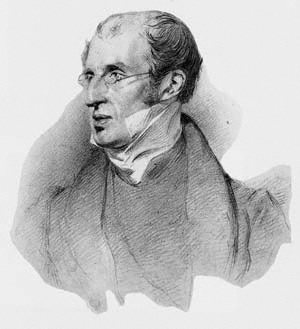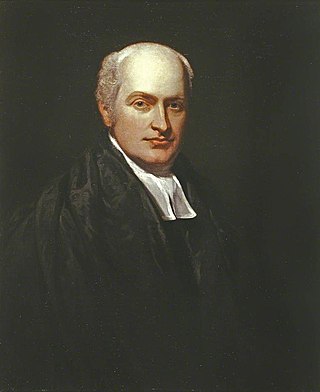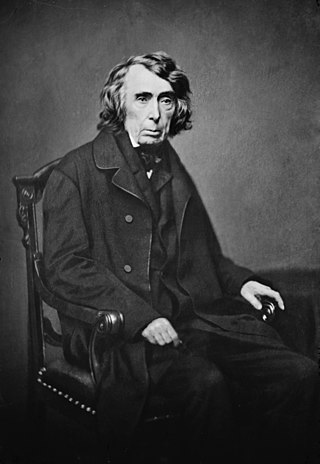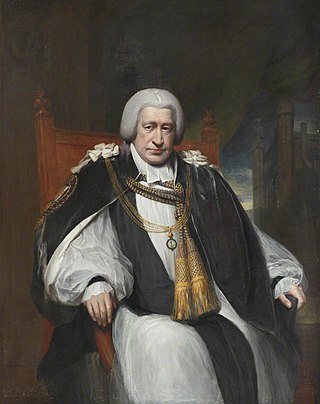
Lancelot Andrewes was an English bishop and scholar, who held high positions in the Church of England during the reigns of Elizabeth I and James I. During the latter's reign, Andrewes served successively as Bishop of Chichester, of Ely, and of Winchester and oversaw the translation of the King James Version of the Bible. In the Church of England he is commemorated on 25 September with a lesser festival.

James Smithson was an English chemist and mineralogist. He published numerous scientific papers for the Royal Society during the late 1700s as well as assisting in the development of calamine, which would eventually be renamed after him as "smithsonite". He was the founding donor of the Smithsonian Institution, which also bears his name.

Shute Barrington was an English churchman, Bishop of Llandaff in Wales, as well as Bishop of Salisbury and Bishop of Durham in England.

Hugh James Rose (1795–1838) was an English Anglican priest and theologian who served as the second Principal of King's College, London.

Walter William Skeat, was a British philologist and Anglican deacon. The pre-eminent British philologist of his time, he was instrumental in developing the English language as a higher education subject in the United Kingdom.

Cancer (♋︎) is the fourth astrological sign in the zodiac, originating from the constellation of Cancer. It spans from 90° to 120° celestial longitude. Under the tropical zodiac, the Sun transits this area between approximately June 22 and July 22.

Wolvercote Cemetery is a cemetery in the parish of Wolvercote and district of Cutteslowe in Oxford, England. Its main entrance is on Banbury Road and it has a side entrance in Five Mile Drive. It has a funeral chapel, public toilets and a small amount of car parking. It was awarded plaques as a category winner of 'Cemetery of the Year' in 1999 and 2001.
In English cricket, the years 1826–1845 were dominated by the roundarm bowling issue, which was resolved when the style was legalised in 1835, and by the formation of the first modern county clubs between 1839 and 1845.

Edward Maltby was an English clergyman of the Church of England. He became Bishop of Durham, controversial for his liberal politics, for his ecumenism, and for the great personal wealth that he amassed.
Deutsche Mythologie is a treatise on Germanic mythology by Jacob Grimm. First published in Germany in 1835, the work is an exhaustive treatment of the subject, tracing the mythology and beliefs of the ancient Germanic peoples from their earliest attestations to their survivals in modern traditions, folktales and popular expressions.

The Marshall Court refers to the Supreme Court of the United States from 1801 to 1835, when John Marshall served as the fourth Chief Justice of the United States. Marshall served as Chief Justice until his death, at which point Roger Taney took office. The Marshall Court played a major role in increasing the power of the judicial branch, as well as the power of the national government.
Richard Clarke Sewell was an English lawyer who later moved to Australia.
James Inman (1776–1859), an English mathematician and astronomer, was professor of mathematics at the Royal Naval College, Portsmouth, and author of Inman's Nautical Tables.

The Taney Court refers to the Supreme Court of the United States from 1836 to 1864, when Roger Taney served as the fifth Chief Justice of the United States. Taney succeeded John Marshall as Chief Justice after Marshall's death in 1835. Taney served as Chief Justice until his death in 1864, at which point Salmon P. Chase took office. Taney had been an important member of Andrew Jackson's administration, an advocate of Jacksonian democracy, and had played a major role in the Bank War, during which Taney wrote a memo questioning the Supreme Court's power of judicial review. However, the Taney Court did not strongly break from the decisions and precedents of the Marshall Court, as it continued to uphold a strong federal government with an independent judiciary. Most of the Taney Court's holdings are overshadowed by the decision in Dred Scott v. Sandford, in which the court ruled that African-Americans could not be citizens. However, the Taney Court's decisions regarding economic issues and separation of powers set important precedents, and the Taney Court has been lauded for its ability to adapt regulatory law to a country undergoing remarkable technological and economic progress.

James Montague was an English bishop.

Brownlow North was a bishop of the Church of England.
Reginald Pole Carew was a British politician.
Henry Vesey-FitzGerald, 3rd Baron FitzGerald and Vesey, was an Irish Dean in the middle of the 19th century.
James Pratt (1805–1835), also known as John Pratt, and John Smith (1795–1835) were two London men who, in November 1835, became the last two to be executed for sodomy in England. Pratt and Smith were arrested in August of that year after allegedly being spied through a keyhole having sex in the rented room of another man, William Bonill. Bonill, although not present, was transported to Australia as an accessory to the crime, where he died.
The 1834 United States elections occurred in the middle of Democratic President Andrew Jackson's second term. Members of the 24th United States Congress were chosen in this election. Taking place during the Second Party System, elections were contested between Andrew Jackson's Democratic Party and opponents of Jackson, including the remnants of the National Republican Party. During this election, the anti-Jackson faction began to transition into the Whig Party. Arkansas and Michigan joined the union during the 24th Congress. Democrats retained the majority in the House, and won control of the Senate.











